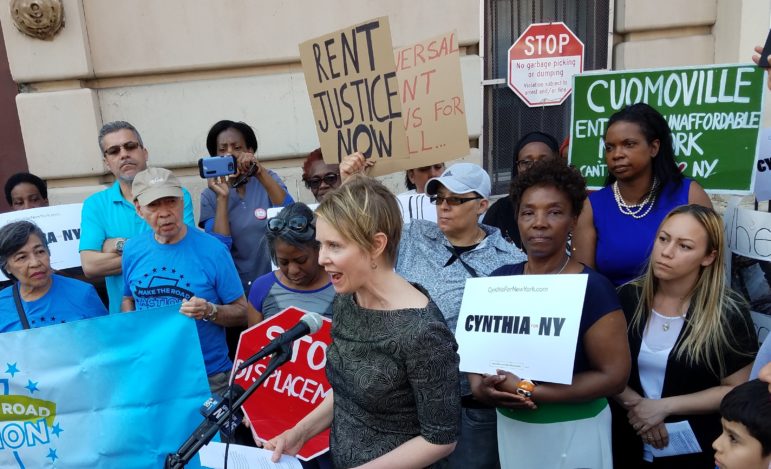
J. Murphy
Nixon blamed the governor for a lack of leadership on strengthening the rent regulations covering millions of New Yorkers.
Democratic gubernatorial challenger Cynthia Nixon on Thursday unveiled the first plank of her housing policy—a call for dramatic reforms to the state’s rent regulations—and accused Andrew Cuomo of failing to make tenants a priority during his seven-plus years as governor.
“Under Governor Cuomo, New York’s renters are being left behind,” Nixon said as she addressed a handful of reporters outside a rent-stabilized building in Morrisania.
Nixon called for an end to vacancy decontrol, the mechanism through which stabilized units get deregulated when their rent breaches a threshold, and vacancy bonuses, which allow landlords to hike the stabilized rent 20 percent whenever a tenant leaves.
Those two mechanisms, advocates say, creative incentives for landlords to drive tenants out and have led to the loss of tens of thousands of stabilized units over the past two decades. Besides stopping future losses, Nixon is vowing to try to re-regulate apartments that have already left the system.
She also wants to end what she calls the “preferential rent loophole,” which allows a landlord who has been charging less than the legally authorized rent because of a soft market suddenly raises the rent to its legal level, forcing tenants to absorb a jump that could far exceed the annual cap on stabilized rent hikes.
And Nixon wants to tighten up the “major capital improvement” and “individual apartment improvement” clauses to permit landlords only a temporary hike in rent to cover improvement costs.
Those headline elements of Nixon’s plan have been on the table in each of the recent battles in Albany over whether to renew or reform the rent laws.
What’s newer is her promise to extend rent regulation to new classes of tenants—people in apartments built after 1974, folks living outside the eight counties (the city, Westchester, Rockland and Nassau) that can opt into the stabilization law and people in smaller buildings not covered by rent stabilization. The latter group would require a new system, according to Nixon campaign materials.
The actress-turned-candidate would also seek to strengthen protections against eviction and increase funding to the state regulators who are supposed to enforce tenant rights.
“We need rent justice,” she said. She linked housing affordability to other key issues, like health and education.
One of the speakers who proceeded her was Natasha Tosca, a resident of 851 East 163rd. She says residents of the building have seen their rent more than double as the landlord undertook overdue repairs, and says she is owed $63,000 in rent overcharges. “This is the cause of homelessness that no one is talking about,” Tosca said. “Gov. Cuomo had eight years to close these loopholes and he has done nothing.”
Francisca Lopez, who lives in another building on 163rd, says tenants there have been harassed, forced to use a bucket for a bathroom, and been exposed to lead by shoddy construction practices. “We have been fighting for years and still might lose because of these weak rent laws,” she said.
Cuomo has signed two renewals of the rent stabilization law since becoming governor. In 2011, he approved a bill that tightened slightly the rules on vacancy bonuses and individual apartment improvements and that raised the thresholds for decontrol. The following year, Cuomo launched a Tenant Protection Unit aimed at improving compliance with the rent laws; the governor says TPU has helped re-regulate tens of thousands of apartments that had illegally exited the stabilization program. In 2015, Cuomo signed a rent act that made minor adjustments in the laws.
The rent laws are up for renewal again in 2019.
According to the 2017 Housing and Vacancy Survey, there were more than 966,000 stabilized apartments in New York City. Their occupants had a median income of $44,560 and paid a median contract rent of $1,279 per month.
Asked if the lack of stronger reforms was the fault of Cuomo or of the state senate that has been Republican-controlled during his tenure, Nixon (who has the Working Families Party nomination and is seeking the Democratic one) said, “We need leadership on this issue. Governor Cuomo has given a lot of lip service on this.”
Cuomo’s campaign said in a statement: “The governor has dedicated his life to addressing homelessness and housing issues, beginning when he launched HELP more than thirty years ago and as HUD secretary during the Clinton Administration.”
Citing the governor’s work for “the strongest tenant protections in a generation” and his $20 billion homelessness and affordable housing program, the statement continued: “The governor’s record protecting and strengthening the rights of all of New York’s tenants is unmatched – we’ll leave the unfunded promises and election-year rhetoric to others.”








